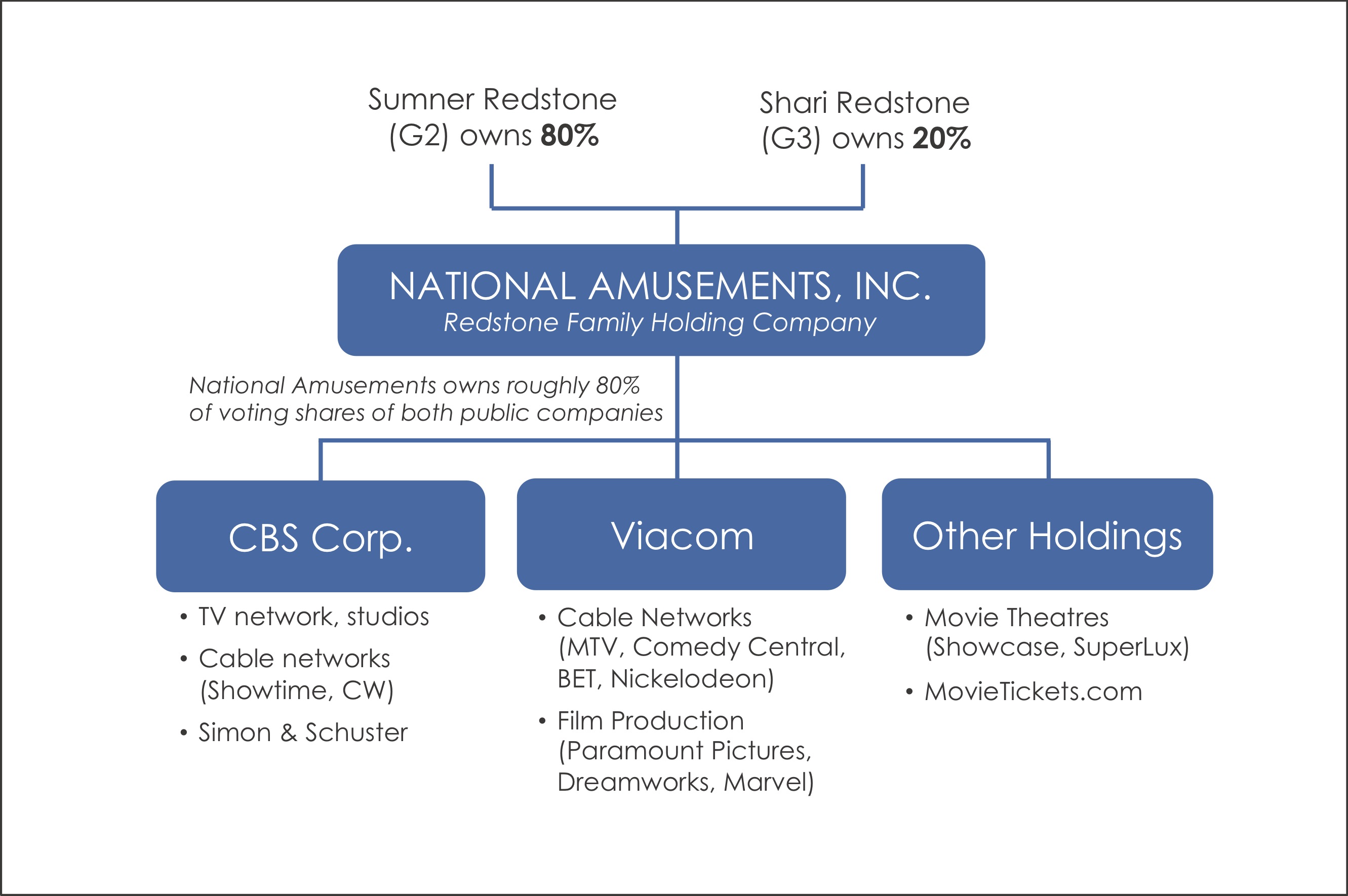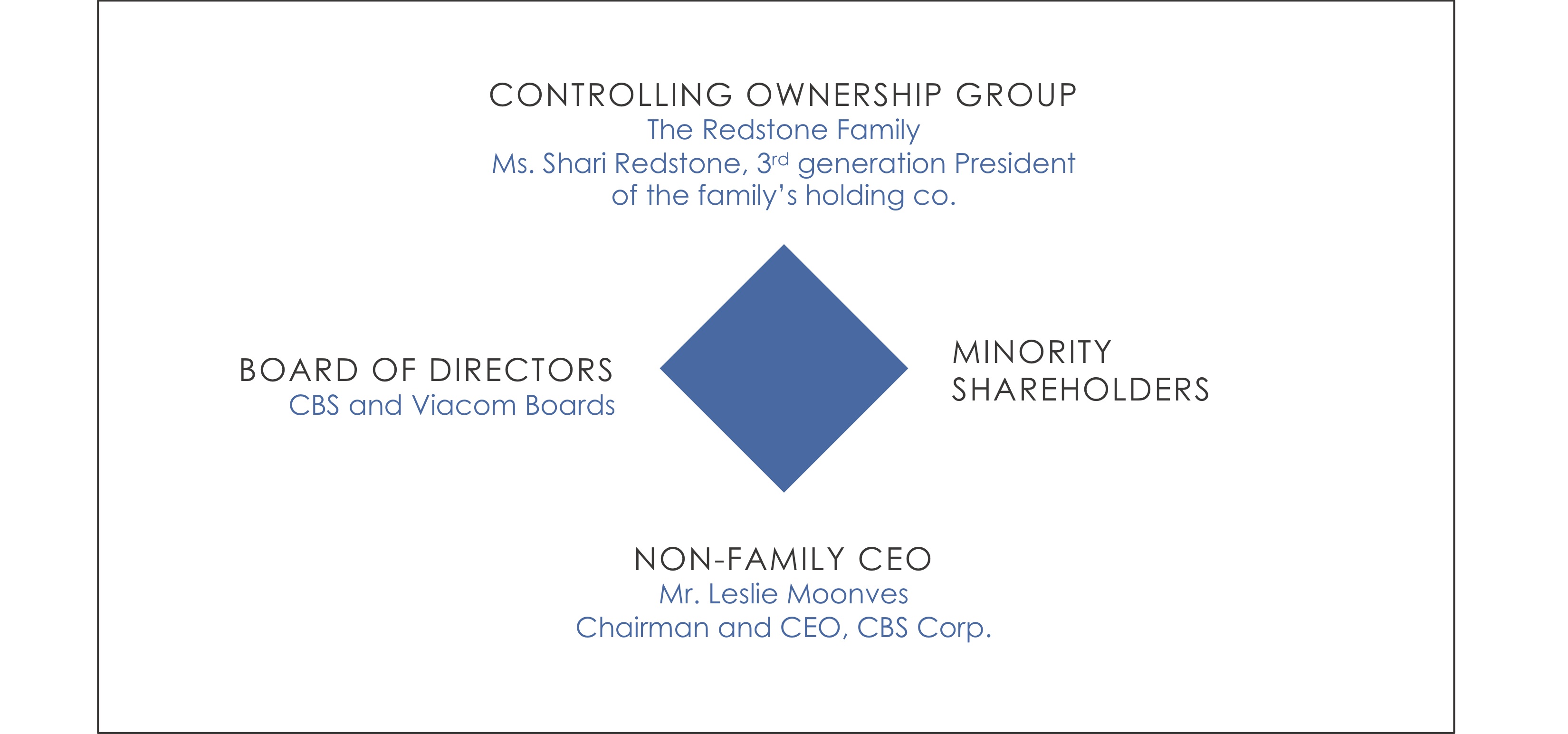CFEG COMMENTARY ON RECENT NEWS
 Shari Redstone, the third-generation president of her family’s U.S. media empire, National Amusements, Inc. (NAI), entered a courtroom in May 2018 to fight to maintain her family’s ownership control of one of their businesses. Her father, Sumner Redstone, spent decades growing his father’s drive-in theatre chain into a $40 billion portfolio of cable networks, television production and broadcasting companies, publishing houses, movie studios, and movie theatres. This legal battle pitted the Redstone family against the board of directors of one of their two main operating companies, CBS Corporation, the $13 billion television broadcast company, and the highest performing of the family’s holdings.
Shari Redstone, the third-generation president of her family’s U.S. media empire, National Amusements, Inc. (NAI), entered a courtroom in May 2018 to fight to maintain her family’s ownership control of one of their businesses. Her father, Sumner Redstone, spent decades growing his father’s drive-in theatre chain into a $40 billion portfolio of cable networks, television production and broadcasting companies, publishing houses, movie studios, and movie theatres. This legal battle pitted the Redstone family against the board of directors of one of their two main operating companies, CBS Corporation, the $13 billion television broadcast company, and the highest performing of the family’s holdings.
The situation had boiled to the point of endangering the Redstone family’s controlling ownership of CBS. In the Spring of 2018, headlines like this were plastered in the business press: “CBS board members could take voting control from the Redstones” (New York Post). This possibility seemed inconceivable.
How can the board of directors of a family-controlled company threaten to seize ownership control from the controlling family?

As a Crisis Unfolds, there are Lessons to be Learned
Family-owned businesses, like all businesses, face threats of many kinds. But the prospect of a family losing ownership control of its highest-performing company is a setback for which few families are prepared.
This article will not delve into interpreting the drama of the power struggle between Ms. Redstone (the controlling owner) and Leslie Moonves (the non-family Chairman and CEO of CBS who has been with the company for more than 20 years). Rather, it provides a helpful framework for business families to understand:
- The complexity of related party transactions (when a family attempts to merge or acquire two businesses they own)
- The scope of authority of active owners
- The role of independent directors on the board of a family business
- The challenges that arise when there is ma isalignment between the desires of the owners and the duty and responsibilities of independent directors
- A particular vulnerability to a family’s ownership control when their company is publicly-traded
The story of the Redstone family continues to unfold in real-time, and serves only as a backdrop example in this article to help other families avoid the legal, financial, emotional, and reputational toll that misalignment between the owners and board can bring to a family and its business.
The Complexity of Multiple Stakeholders
An inherent trait of family businesses is the presence of competing goals and interests from multiple stakeholders in the system. This is as true for small, first generation family businesses as it is for multigenerational, international conglomerates. Family businesses are constantly faced with the complexity and delicate challenges that arise from balancing these different stakeholders’ perspectives.
This becomes especially complicated when family businesses grow to the level of complexity of the Redstone family’s. NAI is a $40 billion conglomerate that controls CBS (the television network, 200 television and 144 radio stations), Viacom (138 cable networks including MTV and Nickelodeon), Simon & Schuster (publisher), Paramount Studies (movie studios), 300 internet sites, and domestic and international movie theatre chains. Today, NAI has approximately 80% controlling voting interest in CBS and Viacom, both of which are publicly-traded and controlled by the family through a dual class share structure where the family controls the voting shares. Add to this a long-time senior management team, independent directors with varying levels of loyalty to the family, and a history of misalignment and public legal battles among the family owners.
The Redstone’s recent, widely-publicized contention over CBS highlights conflicting interests between four important stakeholders: (1) the controlling family ownership group, (2) minority shareholders, (3) the non-family CEO, and the (4) boards of directors. The key stakeholders in the Redstone case are shown below.

When Authority Shifts from the Owners to the Board––and then to the Independent Directors
The Redstone family has spent more than two years attempting to merge their two media companies, CBS and Viacom. This is called a related party transaction, meaning the controlling owners have an equity stake in both companies that they are attempting to merge or acquire. Managing multiple stakeholders is made even more challenging when the family-controlled company considers a merger or acquisition within their own portfolio of companies.
In related party transactions for publicly-traded companies, the decision-making responsibility generally shifts from the full boards of the companies to the independent directors on the boards of both companies. Because the controlling owner has an equity stake in both companies, the two respective boards are seen as having a potential conflict of interest in judging this related party transaction. Therefore, corporate governance laws and New York Stock Exchange (NYSE) regulations require that the independent directors of each of the boards make the decision.
Over the last ten years, the role of independent directors
has assumed a greater importance in the boards of
listed companies all over the world,
including family-controlled companies.
In these situations, it is the independent members of the board who must exercise careful judgement in balancing the potentially competing interests and motivations, and make a sound decision that serves the interest of the controlling or majority owners, minority owners, and both operating companies.
How Ms. Redstone Rose as an Active Owner
Sumner Redstone recruited his daughter, Shari Redstone, away from her law career and into the family business in 1994. She joined the Viacom board and the management team at the family’s holding company, National Amusement, Inc. (NAI), and expanded the company’s global footprint. She succeeded her father as president of NAI in 2000, and went on to experience tension, estrangement, legal battles, and then reconciliation with her father. Meanwhile, she founded a venture capital firm in 2011 to invest in digital media startups.
NAI, CBS, and Viacom have a storied history, which entwined in 1999 when Redstone-owned Viacom acquired CBS. Mr. Moonves had worked at CBS for many years, and became co-president of the newly merged company, called Viacom. Just seven years later, Sumner Redstone decided to de-merge the two companies, saying that the breakup of the empire he created was “necessary to respond to a changing industry landscape.” So in 2006, Viacom and CBS were decoupled, and began trading separately on the New York Stock Exchange.
Fast forward ten years, and in 2016, the Redstones are attempting to re-merge the two companies. CBS has performed very positively, doubling in size since going public in 2006. CBS is highly profitable, has maintained the #1 broadcast television network in prime time for the last nine years, and has an admirable digital streaming strategy. Ms. Redstone believes that a merger of the two media companies will add value to both companies, and wants to help salvage Viacom, which has lost about 15% of its value in the last decade. She suggested to the boards and CEOs of both companies that they explore a merger in order to gain greater synergies, competitiveness, and growth prospects. For two years, she has been attempting the merger, and Mr. Moonves and the CBS board have declined it.
Prior to this initiative, Ms. Redstone was able to gain reasonable influence over the Viacom board, but was not able to effectively exercise her control or influence over the CBS board or Mr. Moonves, its Chairman and CEO. According to press reports, the composition of the CBS board has been largely influenced by the CEO, who is well regarded for his strong and effective leadership of CBS. The CBS board has 14 directors, of which 11 are unaffiliated with Ms. Redstone.
[ DID YOU KNOW? ] In publicly-traded companies with minority shareholders, the controlling shareholders or shareholder groups–such as Shari Redstone in Viacom and CBS–have limited power in controlling the composition of their boards and the decisions made by these boards. While a controlling shareholder group can certainly appoint a number of directors to the board, corporate governance rules for listed companies require that a majority of board members be “independent” board members. The definition of independent is complex, but in essence means that the board members must have independence from the owners and the CEO in performing their duties. The independent directors are selected and appointed by the nominating committee of the board, not by the controlling shareholders.
Since 2016, when Ms. Redstone first attempted to re-merge CBS and Viacom, the power struggle between Ms. Redstone and Mr. Moonves has grown and been amply covered by the press. After the CBS board rejected the Redstones’ request for the merger, in February of 2018, Viacom made an offer to acquire CBS at a below-market price. The CBS board largely sided with Mr. Moonves, the Chairman and CEO of CBS in rejecting the Viacom offer. In April of 2018, CBS responded by submitting a lowball takeover bid for Viacom and proposed Mr. Moonves serve as Chairman and CEO of the combined companies. The two sides have been engulfed in lawsuits and courtroom battles for several months.
Both the Viacom and CBS boards have set up special board committees, composed of independent directors, to analyze any potential combination. At the same time, Ms. Redstone is trying to nominate new directors to the board of CBS. But even if she is able to replace a good part of the board, the decision of this merger is left to the independent directors to make.
The Role of the Board and the Independent Director
In the U.S., in the case of publicly-traded companies, the board of directors are typically the decision-making body when major mergers or acquisitions are involved, and certainly when related party transactions take place.
Over the last ten years, the role of independent directors has assumed a greater importance in the boards of listed companies all over the world, including family-controlled companies. Since the corporate governance standards and trends of public companies tend to trickle down and impact private company standards, family businesses—regardless of whether they are public or private—should pay attention. Various rules and regulations now require that boards have a certain proportion of independent directors, and that the key committees of boards—namely the audit, compensation and governance/nominating committees—be headed by independent directors. As long as the independent directors are aligned with the mission, values, and goals of the owners, having their outside perspective outnumber the family directors is useful to families.
[ DID YOU KNOW? ] We often use the terms of “independent” directors and “external” directors interchangeably, but strictly speaking they are different. Independents are completely unconnected and unaffiliated in any way with the controlling shareholders or the CEO of the company, while Externals are outside of the controlling ownership group or executive group, but may have some previous relationship with either group.
While the “mandate” of independent and external directors may be clear on paper, it can become clouded in practice if long-term and short-term goals are not clearly discussed and understood on the board. In the Redstone case, this ambiguity has pit the independent directors against the controlling owner. And because Mr. Moonves was given so much latitude to compose the CBS board with directors who align with him and are not aligned with the Redstone family, the battle lines are drawn.
As long as the independent directors are aligned with
the mission, values, and goals of the owners,
having their outside perspective outnumber
the family directors is useful.
The explicit or legal role of the independent director is, first and foremost, to exercise the fiduciary duty of protecting the interests of all the shareholders of a company. That is, they must look out for the interests of minority shareholders as well as controlling shareholders. Independent directors must also be able to balance the interests of management versus the interests of shareholders. This task becomes more explicit when dealing with the compensation of the CEO and top management as well as risk-taking related to growth objectives. It becomes difficult when the CEO and the owners are not aligned in their interests. In addition, independent directors must also be capable of advising the CEO on key issues of strategy, risks, talent, and compensation.
The Battle for Ownership Control: Ms. Redstone vs. Mr. Moonves
In May 2018, one month after CBS offered to acquire Viacom, the CBS board and its Chairman/CEO, Mr. Moonves continued to react vigorously against Ms. Redstone by filing a complaint against her and NAI, blocking her from removing or changing directors of the CBS board. CBS also filed for the right of the CBS board to approve a special stock dividend which would dilute NAI’s control from 80% to around 20% of the voting shares.
This groundbreaking attempt by a subsidiary company to dilute a controlling shareholder and take away a family’s control of their company represents an unusually forceful rebuttal of Ms. Redstone’s role as controlling owner. Ms. Redstone has responded through legal channels, arguing that the move by the CBS board and its CEO is invalid from a legal perspective. The case is now before the courts.
This groundbreaking attempt by a subsidiary company
to dilute a controlling shareholder and
take away a family’s control of their company
represents an unusually forceful rebuttal of
Ms. Redstone’s role as controlling owner.
The fundamental conflict is the following: Ms. Redstone, controlling owner of both companies through her family’s holding company, NAI, wants to maximize the benefit of her controlling stake by merging CBS and Viacom, thereby creating a more powerful competitor in a changing industry where many other companies are also merging and consolidating their positions.
Mr. Moonves, Chairman and CEO of CBS, wants to ensure that CBS maintains its independence from a controlling owner, wants minority shareholders get the best possible overall financial deal, and that he personally will lead the merged company and be able to choose his successor. He has built a successful track record at CBS and is supported by majority of the board of directors. Mr. Moonves has tried to wrest control from the Redstones several times in the past.
The ultimate outcome of the case is likely to depend primarily on the decisions taken by the independent directors, especially those at CBS.
The task of the independent directors at CBS is to fully understand the motivation of each side (Ms. Redstone and Mr. Moonves) and to defend the side that best represents the interests of the CBS shareholders. The motivation of Ms. Redstone appears to be to maximize the long-term value of her family’s stake in both Viacom and CBS. She says the combined entity would be better prepared to compete in a consolidating media and content market, and could represent a very attractive target for a further mergers or acquisitions.
The motivation of Mr. Moonves appears to be to maximize the returns of CBS shareholders in the short term and to assure that, if the merger is achieved, he (and his team) would have a leadership role in the combined entity.
A Decision in the Hands of the Independent Directors
The role of the independent director becomes hugely important in situations in which there are related party transactions. Once the merger request has been triggered, as in the Redstone case, the controlling owner has, in effect, placed the destiny of the merger or transaction in the hands of the independents. The independent directors must carefully and objectively analyze the arguments presented by the controlling owner as well as by the other stakeholders (in this case the non-family Chairman and CEO). For a period of time, the independent directors at CBS assume “control” of the process of the potential merger. Since there is a legal process in place, the courts will have to decide on the process itself, and will probably side with good corporate governance practices, which say that in these situations, the independents decide on the related party transaction.
In assessing this delicate and complex situation, CBS independent directors must take into consideration the financial aspects of the transaction such as the relative value ascribed to Viacom and CBS shares, as well as the longer-term returns related to the benefits of the merger. In the short term, the financial terms are a very visible factor, but there is also a delicate judgement on the long-term benefits and risks of the merger. To make matters more complex, there is also a debate or decision on who should lead the combined entity, and whether leadership by Mr. Moonves would create the most value to the combined shareholder groups.
Key Takeaways for Business Families
The main lesson here for business families is that the owners, board, and management must be aligned on two essential goals: value creation strategy and time horizons. This principle is simple, but one that is difficult to implement if not done in a continuous manner, with every selection of a new CEO or director. Typically, in a publicly-traded, family-controlled company, there are not many formal “forums” or opportunities for active owners to interact with boards and non-family CEOs; their main lever is during the selection process. Nevertheless, active owners and board members should have more continuous dialogue regarding these two essential goals.
In most situations, family owners are able to influence the board more broadly by nominating a majority of carefully selected board members, some of whom may be qualified family members. In addition, active owners typically maintain a close and frequent dialogue with board members and with the CEO to build relationships and alignment. This apparently did not happen in the case of CBS.
At times, the owners and the board must recognize that a CEO with a shorter-term motivation may not fit with the long-term orientation of most family business owners. When the owners and the majority of board members are reasonably aligned on this, the decision to replace the CEO comes naturally. When this alignment does not exist, the situation may literally spiral out of control, as in this case.
Short-term oriented CEOs often don’t fit in long-term oriented family businesses.
What should be done by the independent directors in the Redstone case? The most prudent path forward appears to be to allow the merger to take place, under appropriate financial terms, and to implement a sound succession plan and compensation policy for the CBS CEO and management team. Spending time in court is clearly menacing to value creation for all shareholders.

Eduardo Gentil is an advisor to multigenerational family enterprises on issues related to family and ownership governance; ownership strategies; shareholder agreements; establishing or strengthening boards of directors; financial planning for families, family offices, and businesses; succession planning; and next generation talent development. He is a frequent speaker and instructor on family enterprise best practices. Since 2000, he has led the São Paulo office of Cambridge Advisors to Family Enterprise, a global advisory firm serving business families, where he is Senior Partner.


 A History of Corporate Governance around the World
A History of Corporate Governance around the World  Generation to Generation
Generation to Generation  Family Business Governance, Heritage and Sustainable Growth
Family Business Governance, Heritage and Sustainable Growth